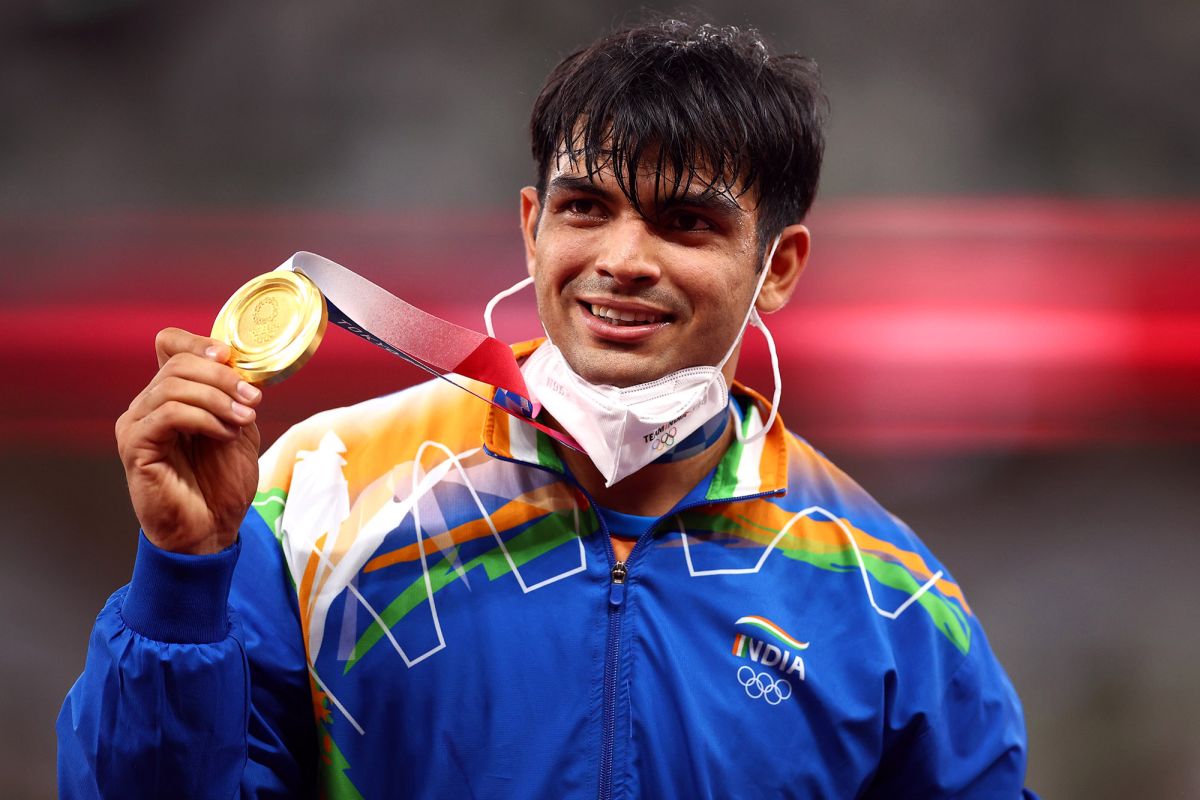Who is Himani Mor, Neeraj Chopra’s wife? Olympic champion announces wedding to tennis star
Olympic champion Neeraj Chopra announces his wedding to tennis player Himani Mor in an intimate ceremony, sharing heartfelt moments with fans.
The greatest battle is within.

Neeraj Chopra after winning India's first-ever gold medal in athletics at the Tokyo Olympics.(Photo: Twitter)
The strangest Olympics in history successfully concluding in Tokyo on Sunday night was proof again how a positive mind-set can overcome controversies and Covid-19; and amid peculiar pandemic challenges India’s athletes delivered the country’s best ever Olympics medal-table ranking. Neeraj Chopra’s 87.58m javelin throw hurled open what will be a golden age for India and Indian sports. “It’s a mental game”, Chopra said ahead of his gold-winning javelin effort that unforgettable Saturday evening of August 7.
So it is. Mind matters most – more so when small margins separate success from the nearly successful. Chopra said he distanced himself from many distractions of the Olympic Village, kept away from social media. Unlike many other nearly successful Indian athletes the past 15 days, he had the mental strength not to succumb to pressure in the medal round.
Advertisement
A day after the Games ended, the ‘Happy Clips’ 24/7 live YouTube video stream of the Olympics Village on Tuesday 10.30 am showed the last remaining athletes strolling or jogging around. Qantas had on Monday issued boarding passes in the Village to reduce the departing rush at Haneda International Airport 15 km away.
Advertisement
Removal trucks occupied the broad Village roads that had beautiful little automated electric buses ferrying athletes, the mini-buses moving with the same careful efficiency with which hospitable Japan organized the most difficult Olympics ever. On Monday, the massive twofloor dining centre serving the muchappreciated 700-dish menu had closed half its counters. A few of the army of smiling volunteers remained.
The emptying Olympics village and now silent venues left again as legacy reminders that life is not merely about winning or losing. More helpful is ensuring two letters next to the name: ‘PB’ (Personal Best). Give the best effort. Success follows. We can ask no more from those giving their personal best. Families of athletes, governments and sponsors funding them can be content. Six of the eight finalists ran their PB (personal best timing) in the 800 m women’s final on Day 11.
Amid turbulence of our existence, millions follow sports not merely as escapist entertainment but because sporting heroes capsule life in minutes. They can inspire. And they can move us to tears of joy, as did Mirabai Chanu gaining India a medal on the first day of the Olympics. Tokyo had sagas of courage, in a quadrennial triumph of the human spirit since the earliest Olympic Games in ancient Greece 2,400 years ago. Olympia in Peloponnese hosted the first star athletes like Theagenes from Thasos, Leonidas from Rhodes and princess Kyniska from Sparta who won the four-horse chariot race in 396BC and 392BC.
As millennia ago, winners were not the only heroes in Tokyo. Heptathlon world champion Katarina Johnson-Thompson spent five years away from her family in Liverpool to train in France and the past year fighting injuries. The 28-year old Thompson collapsed injured on the track in the 200-metre heats last Thursday. She lost her Olympic medal hope and four years of painfilled work. She rejected the wheelchair the four medics offered, stood up unsteadily and hobbled her way to the finish line.
The lesson of courage: never give up. Success is a hard road paved with courage through defeat and difficult times. Olympic gold winner Neeraj Chopra serves in the Indian Army’s Rajputana Rifles regiment that has for its motto: ‘Veer bhogya vasundhara’ (‘The brave shall inherit the earth’). Courage increases with equanimity, detachment – not increasing pressure on oneself with craving. “I don’t think about milestones or medals,” Chopra said earlier this year, “but focus on doing my best and becoming better with each competition.”
Chopra said he practices meditation. So does a generation in India growing up with meditation to cope with life’s challenges. The Maharashtra state government, for instance, has compassionately enabled the world’s largest human resource development initiative ‘Mitra Upakram’ (mitraupakram.vridhamma.org) to teach the ancient Anapana meditation to 25 million school children in the state. By using one’s natural breath as a non-sectarian exercise to develop mental strength, Anapana – the preliminary to the life-changing Vipassana – gives children the self-dependent capacity to cope with stress in studies and life, to keep away from distractions and dirty addictions.
The greatest battle is within. As with people from other professions, mental strength from meditation will help athletes for life. It helps aim and achieve higher goals. My economics professor at Loyola College said, “Don’t just aim for the stars, aim for the highest stars”. The aim is to make best use of life, every moment. This moment never comes back. So we make use of every chance, here and now. “Wir. Jetzt. Hier” said the banner (meaning “we, here, now”) from the building housing German athletes in the Tokyo Olympics village, proclaiming the importance of this present moment in life.
The Olympic Village street lights blended with the dying daylight on Monday 6.44 pm. The ‘Happy Clips’ live YouTube video feed showed young trees and few remaining national flags waving in the evening breeze as final farewell. All things come to an end. In the month when India gained freedom in 1947, 23-year old Neeraj Chopra has shown the august golden way: his noted indifference to monetary gains, his humble dealings with others, his use of meditation to gain the determined discipline and balance of mind needed to achieve golden goals amid challenges – in both mundane and supra-mundane life.
(The writer is a senior, Mumbai-based journalist)
Advertisement